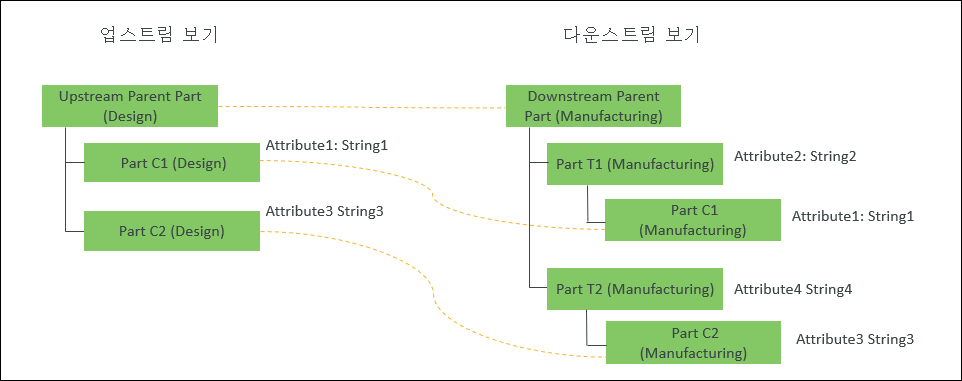사용 사례 1: 부품 속성에 따른 다운스트림 구조 생성
BOM 변환기에 다음 구조가 존재한다고 가정해 보십시오.

• Upstream Parent Part (Design) 및 Downstream Parent Part (Manufacturing) 사이에 등가 링크가 존재합니다.
• 구조에 있는 모든 부품은 부품 유형이 wt.part.WTPart입니다.
부품 속성을 기반으로 다운스트림 구조를 생성하려면 규칙 파일 또는 등록 정보 파일을 사용하여 변환 및 재구성 규칙을 지정할 수 있습니다.
규칙 파일 사용
{
"transformRules": [
{
"sourceType": "wt.part.WTPart",
"newAttributeMappings": [
[
"source.usage.Attribute1:String1",
"target.part.Attribute2:String2"
],
[
"source.usage.Attribute3:String3",
"target.part.Attribute4:String4"
]
],
"targetType": "wt.part.WTPart",
"transformOption": "newPart"
}
]
}
"transformRules": [
{
"sourceType": "wt.part.WTPart",
"newAttributeMappings": [
[
"source.usage.Attribute1:String1",
"target.part.Attribute2:String2"
],
[
"source.usage.Attribute3:String3",
"target.part.Attribute4:String4"
]
],
"targetType": "wt.part.WTPart",
"transformOption": "newPart"
}
]
}
등록 정보 파일 사용
1. Windchill/codebase/com/ptc/core/foundation/associativity에 있는 associativity.properties.xconf 파일에 액세스합니다.
2. associativity.properties.xconf 파일에 다음 재구성 규칙을 추가합니다.
<AddToProperty name="com.ptc.windchill.associativity.reconciliation.addusage.wt.part.WTPart" value="transformOption=newPart"/>
<AddToProperty name="com.ptc.windchill.associativity.reconciliation.addusage.wt.part.WTPart" value="targetType=wt.part.WTPart"/>
<AddToProperty name="com.ptc.windchill.associativity.reconciliation.addusage.wt.part.WTPart" value="attributeMapping.rule1=Attribute1:String1:Attribute2:String2"/>
<AddToProperty name="com.ptc.windchill.associativity.reconciliation.addusage.wt.part.WTPart" value="attributeMapping.rule2=Attribute3:String3:Attribute4:String4"/>.
매핑과 관련된 등록 정보의 경우 업스트림 및 다운스트림에 대해 지정된 매핑 속성은 동일하지 않아야 합니다.
업스트림에서 선택한 부품에 대한  작업을 시작하면 Windchill 시스템이 선택한 부품 아래의 구조를 트래버스합니다. 이 구성을 통해 다음이 수행됩니다.
작업을 시작하면 Windchill 시스템이 선택한 부품 아래의 구조를 트래버스합니다. 이 구성을 통해 다음이 수행됩니다.
 작업을 시작하면 Windchill 시스템이 선택한 부품 아래의 구조를 트래버스합니다. 이 구성을 통해 다음이 수행됩니다.
작업을 시작하면 Windchill 시스템이 선택한 부품 아래의 구조를 트래버스합니다. 이 구성을 통해 다음이 수행됩니다.• Windchill 시스템이 부품 속성 Attribute1이 String1로 설정된 부품을 감지하면 감지된 부품이 다운스트림 구조에서 부품 속성 Attribute2가 String2로 설정된 부품 아래에 새 부품으로 추가되고 부품 유형은 wt.part.WTPart입니다.
• Windchill 시스템이 부품 속성 Attribute3이 String3으로 설정된 부품을 감지하면 감지된 부품이 다운스트림 구조에서 부품 속성 Attribute4가 String4로 설정된 부품 아래에 새 부품으로 추가되고 부품 유형은 wt.part.WTPart입니다.
BOM 변환기에서 다음 구조가 나타납니다.

Part C1 (Manufacturing) 및 Part C2 (Manufacturing)는 각각 Part T1 (Manufacturing) 및 Part T2 (Manufacturing) 아래에 새 부품으로 추가됩니다.